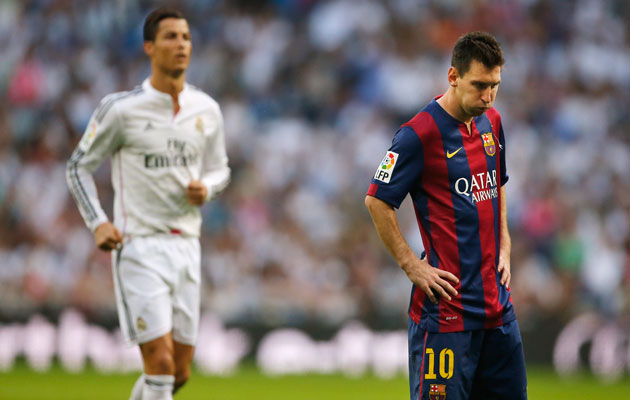Lionel Messi stood with his head bowed. He looked on the verge of tears, with his shoulders slumped. In his hands, he held the Golden Ball as player of the World Cup. Irrespective of the fact that the award seemed a little odd based on the evidence of the knockout stage, the moment jarred.
Of course he was distraught: his side had just lost in the World Cup Final. To make him collect an award shortly after the final whistle was almost cruel. Beyond extinguishing any lingering doubts as to whether Messi really cared about playing for Argentina, the moment seemed to hint at a deeper truth: FIFA, by presenting the Golden Ball then, wanted to enhance the prestige of the individual award. It might not be as important as the World Cup itself, it seemed to be saying, but the prize belonged in the same ceremony.
This valourising of the individual is a growing trend in football, one reflected in the hysteria that seems to surround the Ballon d’Or each year. In part, that’s because the on-going soap opera of the Barcelona-Real Madrid rivalry has been distilled in recent years into the rivalry between Messi and Cristiano Ronaldo, two exceptional players who seem to break new records every week. The problem comes when those records and individual awards become ends in themselves.
But, in part, it’s also the nature of modern media and modern fandom. The traditional fan, the fan of even 20-30 years ago, would go and watch his local team. He would watch highlights of other matches and the occasional live game on television, but essentially he would be invested in the side he could watch. Now, with the proliferation of television coverage, it’s easy to watch live games from all over the world, and fans increasingly support teams with which they have no immediate emotional or geographical connection. The Premier League’s apparent desire to start hosting games abroad is rooted in this globalisation of interest.
Those fans, necessarily, are more fickle, more likely to be drawn by a particular style of play or by a particular player who excites them. That suits the money men in football because it’s much easier to market an individual than a team. Here is Ronaldo, they can say, with his majestic physique and array of tricks and brilliant goals, which is much easier than trying to capture a club’s nebulous strands of tradition and the shifting cast of players.
“Media and marketing people started to individualise football performance,” says Thierry Henry.
“People stopped highlighting the collective dimension of the game, how a goal was constructed, how a phase started. The game is too polarised on the individual. Stars are fine. But within the team, not without.
“I’ll tell you, I grew up with Michael Jordan, who scored up to 60 points in some [basketball] games at the beginning of his career. He scored fewer when Scottie Pippen and Horace Grant came to Chicago – but he started winning titles too. That’s the truth. He was a star within a collective. When you’re not at your best, the others conceal your weaknesses.”
The comparison with basketball is telling – particularly given FIFA’s weird dictats on national-team kits which, in demanding simple designs and that each match should be a “dark” colour against
a “light” colour, seem a deliberate aping of the NBA, which seems self-consciously to fetishise the individual.
There was a piece by Malcolm Gladwell in the New Yorker in May 2009 in which, discussing how Davids could beat Goliaths, told the story of Vivek Ranadive who, knowing little about basketball having been brought up in Mumbai, began to coach his daughter’s under-12 team, Redwood City.
Employing a little of what he knew of football tactics, he employed a full-court press and his side of no-hopers starting beating far more talented sides and reached the play-offs – before a ref who, Ranadive believes, took against what at that level were unorthodox tactics and began calling fouls for the slightest contact.
Whatever the rights and wrongs of that particular case – and the article produced a storm of critical reaction from people within basketball – what was clear to an outsider was the distaste for pressing within the sport. Zonal defence was even outlawed in the NBA before the 2001-02 season.
The collective Henry talks about at the Chicago Bulls is a team in the sense of players who pull together; it is not a team in the way that Arrigo Sacchi or Viktor Maslov (Torpedo Moscow and Dynamo Kiev coach of the 1960s) would have understood it – in which the component parts matter far less than the whole – but in which the system, by its very nature, if correctly and diligently employed, has a multiplicatory effect.
There is an irony, here, of course, in that one of the two great individuals of European football over the past five years or so, have been playing for a side that prioritises the collective over all else.
In fact it’s probably the case that the greatness of Pep Guardiola’s Barcelona team lay in the combination of the tiki-taka formula and the individual genius of Messi, the one enhancing the other.
This is a strange debate in which Guardiola and Jose Mourinho probably find themselves on the same side, in privileging the team, but Henry surely has a point. Thanks to the way the game is consumed now, there is an increasing focus on tricks and individual skill, filtered through PlayStation games and YouTube clips at the expense of the team ethic.
Sacchi has complained of the increasing focus on “specialists” and yet at the same time systematised pressing is accepted more widely than ever before.
A tension has developed between the tactics of the game and how it is consumed – and perhaps even how FIFA, with an eye on marketing, wants it to be consumed.
By Jonathan Wilson







